 Petzlover
Petzlover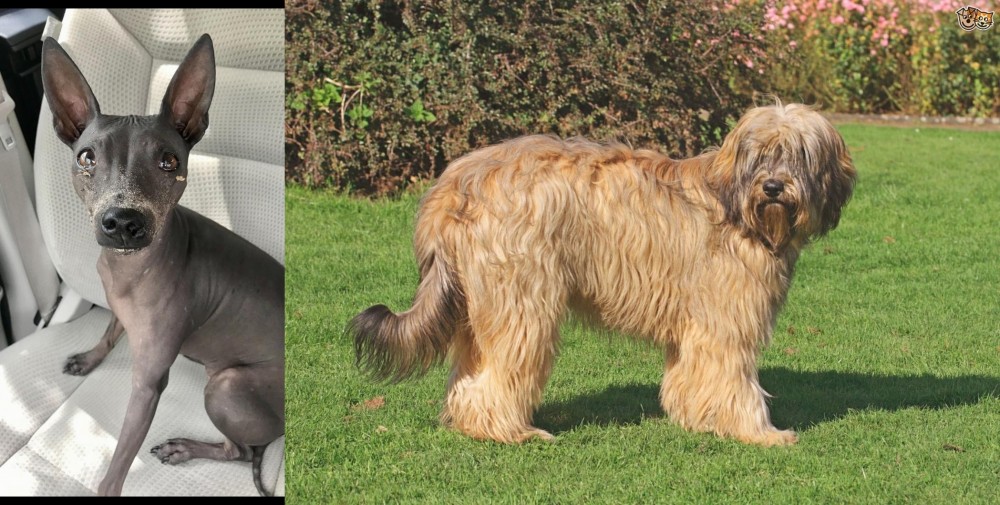 American Hairless Terrier is originated from United States but Catalan Sheepdog is originated from Spain. American Hairless Terrier may grow 10 cm / 3 inches shorter than Catalan Sheepdog. American Hairless Terrier may weigh 13 kg / 28 pounds lesser than Catalan Sheepdog. Both American Hairless Terrier and Catalan Sheepdog has almost same life span. Both American Hairless Terrier and Catalan Sheepdog has almost same litter size. American Hairless Terrier requires Low Maintenance. But Catalan Sheepdog requires Moderate Maintenance
American Hairless Terrier is originated from United States but Catalan Sheepdog is originated from Spain. American Hairless Terrier may grow 10 cm / 3 inches shorter than Catalan Sheepdog. American Hairless Terrier may weigh 13 kg / 28 pounds lesser than Catalan Sheepdog. Both American Hairless Terrier and Catalan Sheepdog has almost same life span. Both American Hairless Terrier and Catalan Sheepdog has almost same litter size. American Hairless Terrier requires Low Maintenance. But Catalan Sheepdog requires Moderate Maintenance
 Derived from the Rat Terrier, the American Hairless Terrier was born in a litter of Rat Terriers in 1972.
Derived from the Rat Terrier, the American Hairless Terrier was born in a litter of Rat Terriers in 1972.
The evolution of this breed is very different from other hairless breeds. The American Hairless Terrier was independently developed when a hairless pup was produced in a litter of normal Rat Terriers. The owners of this pup, Edwin and Willie Scott attempted to breed her to other Rat terriers but were not successful in having another hairless pup until years later. Then they had a litter with one male and one female hairless puppy.
From that point on they worked with a veterinarian and a geneticist to develop the breed until it was accepted as a separate breed from the Rat Terrier in 2004 and accepted into the AKC in 2016.
The breed is very rare and with hairless dogs breeding only produces about two thirds of the litter as hairless and one third as coated. If a hairless is bred to a coated terrier, the chances of getting hairless puppies are 50% hairless and 50% coated. It is very rare to get a hairless when breed two coated terriers. The difference between the American Hairless Terrier and other hairless breeds is that the hairless gene in most breed is a lethal dominant gene, but in the AHT it is a recessive gene.
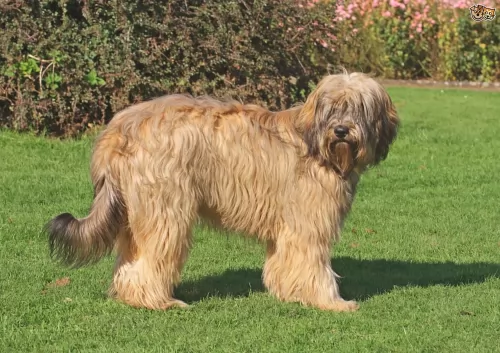 The Catalan Sheepdog, known also as the Gos d’Atura, hails from Catalonia, Spain. It is believed that the dog is related to the Portuguese- and Pyrenean Sheepdogs.
The Catalan Sheepdog, known also as the Gos d’Atura, hails from Catalonia, Spain. It is believed that the dog is related to the Portuguese- and Pyrenean Sheepdogs.
The standard for this breed was formulated in 1929. The sheepdog developed during Roman Empire times between 200 and 100 BC already, being used as livestock guard dogs. With the breed dwindling in the 1970s, Catalonian Sheepdog lovers started promoting it, but it remains a rare breed.
 The American Hairless Terrier is similar to it’s breed of origin, the Rat Terrier, and the coated AHT looks very much like a Rat Terrier. They are small to medium in size, very muscular and have more refined features than the Rat Terrier. Their round eyes can be a variety of colors including amber, brown, grey, turquoise and blue. The tail is not docked but rather long and thin.
The American Hairless Terrier is similar to it’s breed of origin, the Rat Terrier, and the coated AHT looks very much like a Rat Terrier. They are small to medium in size, very muscular and have more refined features than the Rat Terrier. Their round eyes can be a variety of colors including amber, brown, grey, turquoise and blue. The tail is not docked but rather long and thin.
The AHT might have eyebrows and whiskers or they might only have whiskers. Their head is broad, and wedge shaped with upright ears. They are an energetic, social and intelligent dog.
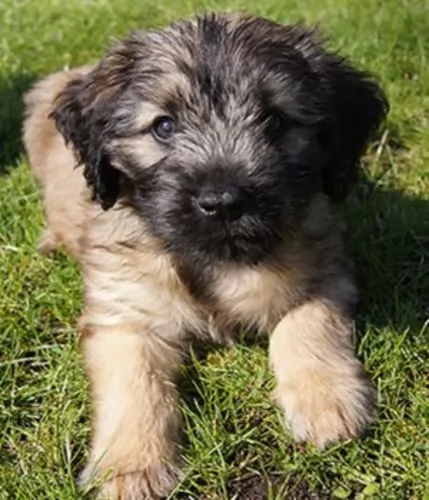 The Catalan is a medium sized dog but gives the impression of being bigger than he actually is. He stands from 45 – 55cm in height and weighs between 20 to 25kg.
The Catalan is a medium sized dog but gives the impression of being bigger than he actually is. He stands from 45 – 55cm in height and weighs between 20 to 25kg.
This breed also has double dew claws on the hind feet. He has a long coat which is slightly wavy and available in different shades such as fawn to brownish to dark grey to black. He has floppy, feathery ears and a fairly long, feathery tail. He has quite a bit of hair on he face too, so you’ll notice a beard, moustache as well as hair which covers the eyes somewhat.
Brave and courageous, the Catalan Sheepdog is also intelligent, active and hardy. He has a round face with a friendly, amicable expression. He is totally pleasant and sweet natured. However, in his role as guardian of sheep he took his role seriously, forming a strong relationship with both shepherd and sheep.
He is wary of strangers. Early socialization and training is always important, and while he makes a wonderful family pet, this training and socialization makes him more relaxed and obedient and he gets on well with children in the home as well as with other pets. While he is a placid, docile and gentle pet, he is also looked upon as a protector, and will defend his family.
 This is a curious, intelligent, little dog. They are terrific family dogs with a note to say they are better with older children than with younger. If they are raised with small children, then they are terrific with them. They are territorial, and the children become part of their territory. They will guard and protect them.
This is a curious, intelligent, little dog. They are terrific family dogs with a note to say they are better with older children than with younger. If they are raised with small children, then they are terrific with them. They are territorial, and the children become part of their territory. They will guard and protect them.
They need to play, and this is the biggest requirement for owners. Be sure you have time for them. This is not a couch potato dog. They have a lot of energy and can be destructive and “barky” if that energy is not dissipated. They are terriers through and through and love to “go to ground” whether going in holes they find or digging the holes themselves. They will go after small rodents like chipmunks. They need to be protected in these activities since their skin is vulnerable to scratches and cuts from brush. Their prey drive is strong, so it is important to protect them from themselves in this respect.
They are curious and feisty and every inch the terrier. Affectionate, friendly, and social it is also important to remember they can be scared easily, hurt if play is too rough, and this will trigger barking. They make very good watch dogs.
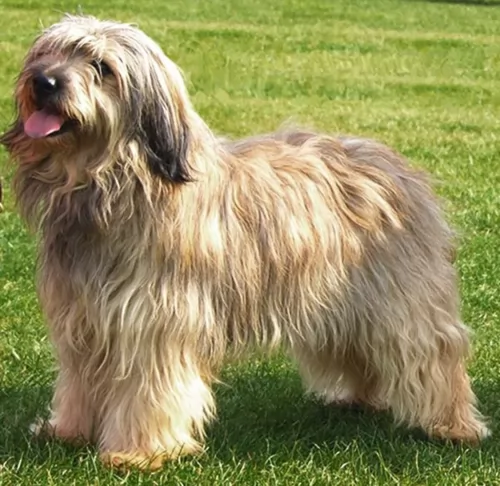 The Catalan Sheepdog is such an amicable character – he is going to make an awesome pet. He is an intelligent and obedient dog and is easily trained.
The Catalan Sheepdog is such an amicable character – he is going to make an awesome pet. He is an intelligent and obedient dog and is easily trained.
He has been used for guarding- and herding work and as a family pet makes a excellent guard dog as well. Capable of being gentle too, he is everything his human family wants him to be and just becomes a regular member of the family.
 There are not many health problems bothering this sturdy little dog.
There are not many health problems bothering this sturdy little dog.
The American Hairless Terrier has limited breeding stock and it is still a rare breed. Its health problems are mostly related to its hairless state. The breed is highly susceptible to sunburn, rashes, pimples, and allergies. They often need clothing in all seasons to protect them from the heat of the sun or from the cold. The skin must be cleaned regularly often daily with soap and water. This is especially true if sunscreen is used as they are open to skin infections.
Hip dysplasia is also a common issue for this small breed.
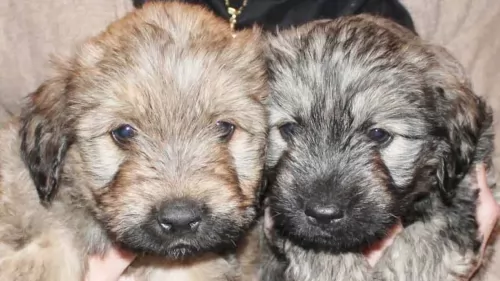 The Catalan Sheepdog is a fairly healthy breed and has a life expectancy of 12, 13 or 14 years. Nonetheless you will still need to watch out with common dog ailments with him, particularly hip dysplasia.
The Catalan Sheepdog is a fairly healthy breed and has a life expectancy of 12, 13 or 14 years. Nonetheless you will still need to watch out with common dog ailments with him, particularly hip dysplasia.
This is a joint and hip disease which can start with symptoms from 6 months of age already. Your dog will be hesitant to play and jump, doesn’t like to go upstairs, tires easily during a walk and develops a hop-like way to walk. You’ll notice that when he lies down, he battles to- or is reluctant to get up again.
X-rays may be required to confirm the diagnosis of hip dysplasia. There are different treatment options, all with the wellbeing of your pet in mind. You don’t want him to have a life of pain and lameness.
 The American Hairless Terrier has some food needs that might be different from other breeds. They should not be given food that contains soy, wheat or corn. They need to be fed at least 3-4 times a day in small amounts as puppies and twice a day as adult. Be sure to avoid overeating and obesity.
Puppies need about 400 calories a day whether you feed four times or two times. The adult American Hairless Terrier needs about 500-600 calories per day. This might be half a cup to a cup per day.
The American Hairless Terrier has some food needs that might be different from other breeds. They should not be given food that contains soy, wheat or corn. They need to be fed at least 3-4 times a day in small amounts as puppies and twice a day as adult. Be sure to avoid overeating and obesity.
Puppies need about 400 calories a day whether you feed four times or two times. The adult American Hairless Terrier needs about 500-600 calories per day. This might be half a cup to a cup per day.
As previously mentioned the American Hairless Terrier has skin health issues and is also prone to hip dysplasia.
This is a great breed for games if you make them small to match his size. He is energetic, athletic and playful. He loves agility, lure chasing and barn hunt activities. They need a good half hour of vigorous exercise per day.
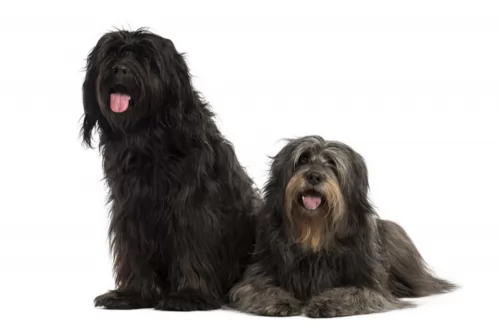 The Catalan Sheepdog is a working breed, so he is going to need plenty of exercise. While he adapts easily to city- or country life, it will be to his benefit to have a garden to romp in. You will still need to take him for walks and play ball- and rope games with him. This will prevent boredom and destructive behavior from him.
The Catalan Sheepdog is a working breed, so he is going to need plenty of exercise. While he adapts easily to city- or country life, it will be to his benefit to have a garden to romp in. You will still need to take him for walks and play ball- and rope games with him. This will prevent boredom and destructive behavior from him.
The Catalan Sheepdog has long hair so he will need to be brushed twice a week to avoid matting. This will help to remove loose hair too, but also distribute natural oils through his coat, keeping his hair and skin healthy and free from skin rashes and itchiness.
This brushing ensures other benefits as you can simultaneously check him for parasites such as fleas and ticks.
If you feed him commercial dog food, make sure its a high quality one. He is an active breed so will require high protein. Give him some homemade rice, vegetables and meat, and include raw meat in his food from time to time too. Always ensure that there is fresh, cool water constantly within reach.